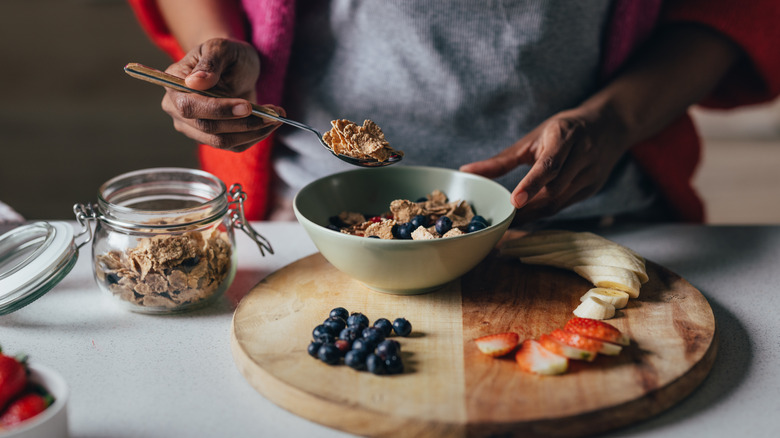How Much Fiber You Should Eat In A Day To Reduce Your Early Death Risk
Fiber is a kind of indigestible carbohydrate that we most often associate with good digestion and poop health. When you consume enough of it, it not only adds bulk and softness to your stool but it also makes everything move along faster in your digestive system. Fiber-rich foods include fruits, vegetables, grains, legumes, nuts, and seeds.
Fiber is also fuel for your gut microbiome, and if you've read anything at all about gut health, you know that the state of your gut bacteria can dictate a lot of things health-wise. How well your immune system functions, your mental health, your risk of gastrointestinal disorders and chronic disease, and your sleep are connected to your gut health in some way or another.
Perhaps it's not a total surprise then to state that your dietary fiber intake could help you prevent an early death. But just how much should you be consuming? According to 2019 systematic review and meta-analysis of 185 observational studies and 58 clinical trials conducted over nearly 40 years, and published in The Lancet, consuming 25 to 29 grams of fiber daily is adequate, if you're thinking about preventing chronic disease and premature death. Anything more could offer better protection. There was a 10% decrease in risk of all-cause death with every 10-gram increase of fiber a day, per a 2015 study published in the American Journal of Epidemiology. Higher fiber intake was linked with lowering the risk of all-cause and cause-specific mortality, per a 2023 study published in Nutrition Journal.
How does fiber prevent early death?
From the observational studies that were reviewed for the 2019 study, researchers found that a higher fiber intake was associated with a 15 to 30% decrease in all-cause and cardiovascular-related mortality, stroke prevalence and mortality, type 2 diabetes, coronary heart disease, and colorectal cancer. The clinical trials revealed significantly lower health concerns for those who had a higher fiber intake, namely decreased bodyweight, systolic blood pressure, and total cholesterol.
Research looking at fiber's influence on your heart health has existed since the '50s and '60s, according to professor of epidemiology and nutrition at the Harvard T.H. Chan School of Public Health Dr. Eric Rimm (via Harvard Health Publishing). How dietary fiber interacts with your gut microbiome (and vice versa) has an impact on various health markers like inflammation, blood sugar, blood pressure, and cholesterol levels. Additionally, consuming sufficient amounts of fiber also means you can keep your calorie count low, per Rim. Insoluble fiber, in particular, can help you feel full for longer, preventing overeating or indulging in cravings.
Maintaining a healthy weight, reducing estrogen levels, lowering your blood sugar, helping remove carcinogens via waste, and contributing to good gut health are some ways in which fiber can help prevent cancer. Eating a certain amount of fruits and vegetables can reduce your early death risk too. Experts also think that the vitamins, minerals, and antioxidants from fruits and vegetables are a protective factor when it comes to disease prevention.
How to include fiber in your diet
There are different types of fiber, soluble fiber and insoluble fiber being the main two kinds. Each of them performs different functions when it comes to your overall health. If you're a woman between 19 and 50 years of age, the general recommendation is 25 grams of fiber a day, per Cornell University. Men of the same age should ideally consume 38 grams a day. For those over 50 years of age, the recommendations are a little lower — 21 and 30 grams for women and men, respectively. This difference in recommendations likely has to do with how many calories a person consumes. But consuming more is not considered unsafe, as the early death-related studies also insinuated. According to Joanne Slavin, a registered dietitian and a nutrition professor at the University of Minnesota, even eating 80 grams a day is okay (via Seattle Times).
On average, U.S. adults eat only 10 to 15 grams of fiber daily. Be mindful that increasing your fiber intake too fast, too soon is going to cause some changes in your digestive system, like bloating, stomach pain, and gas. It's best to start slow. Trying new fiber-rich foods at your own pace and hydrating properly can help you ease into the process.
As for what kind of fiber you should be eating, both are important. Soluble fiber is typically found in foods like oat bran, barley, nuts, seeds, beans, lentils, peas, apples, citrus fruits, and carrots, while insoluble fiber sources are wheat bran, vegetables (like cauliflower, green beans, and potatoes), and whole grains. Fiber aside, there are more foods you're probably not eating that could lower your risk of an early death.



